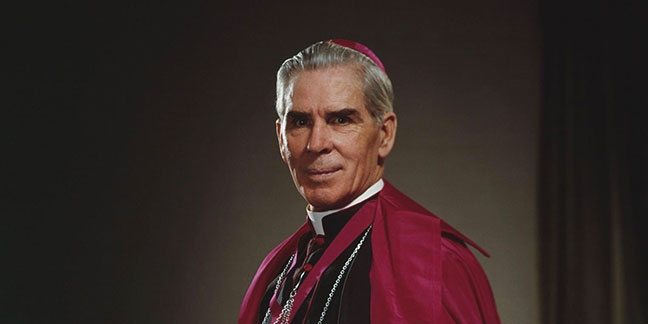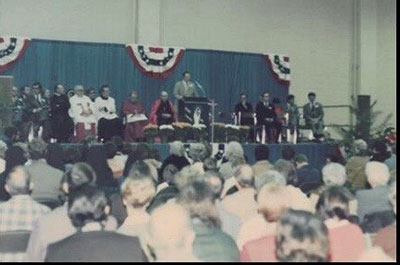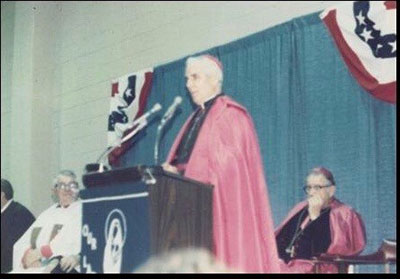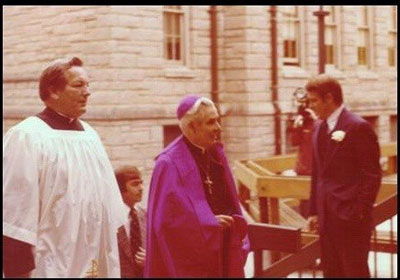A Blessed Day
 GREENSBORO — So beloved is Venerable Archbishop Fulton Sheen at Our Lady of Grace Parish that the story of his visit, 44 years ago this month, passes from parishioner to parishioner in reverent tones. Details of his 1976 blessing of the church and school are met with awe bordering on incredulity because, for some, belonging to a parish graced with a visit from the famed archbishop is almost too good to be true.
GREENSBORO — So beloved is Venerable Archbishop Fulton Sheen at Our Lady of Grace Parish that the story of his visit, 44 years ago this month, passes from parishioner to parishioner in reverent tones. Details of his 1976 blessing of the church and school are met with awe bordering on incredulity because, for some, belonging to a parish graced with a visit from the famed archbishop is almost too good to be true.
It certainly seems to be the case for one devoted family of 11. Parishioners L.T. Terrell, a licensed therapist and EMT, and his wife Casey, a nurse, and their eldest eight children – seven girls and a boy named Fulton (with brother Ian due in February) – enjoy watching Sheen’s “Life Is Worth Living” TV show re-runs and having family discussions about the lessons he imparted.
“His humor and wit are much needed for our generation,” L.T. Terrell said. “Fulton Sheen has had such an impact on us as a family that we decided to name our son after him. We have named our kids down the alphabet: Anna, Bethany, Catherine, Danielle, Emily, Fulton, Gretchen and Hermione. So we happened to be on F for our first boy. We believe it was providence.”
The circumstances certainly are remarkable – they didn’t know until recently, but the date Sheen visited Our Lady of Grace Church is the same as their son Fulton’s birthday: Nov. 14.
Five of the Terrell children attend Our Lady of Grace School. “Knowing Fulton Sheen visited gives me much joy and hope for the future of our school,” Terrell said.
The prolific writer, theologian, preacher and Emmy Award-winning media personality drew a U.S. audience of 30 million in 1957 at the peak of his weekly network telecast “Life Is Worth Living” and he wrote more than 60 books. Sheen became the auxiliary bishop of the Archdiocese of New York in 1951, Bishop of Rochester in 1966, and Archbishop of the titular see of Newport, Wales, in 1969.
He was a regular host on “The Catholic Hour” radio program for 22 years starting in 1930, and he presented “The Fulton Sheen Program” from 1961 to 1968. He spent many years as the national director of the Society of the Propagation of the Faith, raised hundreds of millions of dollars for the world’s poor, donated $10 million of his own money to the missions, was an alumnus and professor at the Catholic University of America, preached retreats, visited the sick and imprisoned, and built churches and hospitals for the poor. He died in 1979.
In 2002 his cause for canonization was opened, and in 2012 he was declared venerable.
The Archbishop Visits Greensboro
Sheen came to Greensboro on Sunday, Nov. 14, 1976, to bless Our Lady of Grace Parish’s new school and activity center at the invitation of the pastor. He celebrated Mass at noon, with the church so full that many of the faithful had to use overflow seating in the new gymnasium.
Later that day, Sheen spoke at the dedication of the new activity center and school. For him, education was about the “whole man – the intellect and will, not just the mind alone,” a philosophy shared at OLG School today, where nurturing the “whole person” is a key part of its mission.
The three-story building then included six classrooms on the third floor and became known as the Upper School while the original school building was designated the Lower School. The original building also includes a gym, cafeteria and administrative offices and was expanded in 2014.
 Bishop Michael Begley, a former pastor of Our Lady of Grace and the first bishop of the Diocese of Charlotte, was also on hand to formally dedicate the parish’s activity center. Greensboro’s mayor and an official from the N.C. Department of Education attended the big event.
Bishop Michael Begley, a former pastor of Our Lady of Grace and the first bishop of the Diocese of Charlotte, was also on hand to formally dedicate the parish’s activity center. Greensboro’s mayor and an official from the N.C. Department of Education attended the big event.
The 81-year-old orator’s voice still had its trademark boom, his blue eyes still pierced, and those present noted his charisma and joviality. One parishioner recalled how blessed she felt to be the last to receive Communion from Sheen at the Mass.
Eileen Rohan, wife of the parish’s retired Deacon Tim Rohan, recalled that Sheen had requested to have the Immaculate Heart of Mary Sisters who ran the school sit in the front rows during Mass. Rohan also noted that the young Columbian Squires of the Knights of Columbus served as escorts for the day. As he prepared to enter the church, Sheen blessed each of the boys, including her own son Tim, as their parents looked on.
It was a meaningful moment for the Rohan family that made them feel more at home in North Carolina. “We had just moved to Greensboro from New York, and we really wanted to see the bishop from where we lived for so long,” Rohan recalled, noting that she regularly prays a novena for Sheen’s beatification and canonization.
 Longtime parishioner Don Brady assisted then-pastor Father Francis Smith as the chair of the capital campaign for the 1976 school expansion. Brady recalled, “He was a very tiny man with the deepest blue eyes I have ever seen, and he really was wonderful at looking at the person he was talking to. He loved our church.”
Longtime parishioner Don Brady assisted then-pastor Father Francis Smith as the chair of the capital campaign for the 1976 school expansion. Brady recalled, “He was a very tiny man with the deepest blue eyes I have ever seen, and he really was wonderful at looking at the person he was talking to. He loved our church.”
Beatification Anticipation
Sheen is expected to be named a Blessed in Peoria, Ill., near his birthplace of El Paso, Ill. Beatification, an act in which the Church allows a candidate for sainthood to be venerated publicly in places closely associated with his or her life and ministry, brings him to the final step before canonization as a saint.
In July, Pope Francis approved a miracle attributed to Sheen, involving a Peoria baby who had just been born but had no pulse and wasn’t breathing. Bonnie and Travis Engstrom, as well as their family and friends, prayed for Sheen’s intercession to save their baby’s life and heal any damage to his body. After 61 minutes, James Fulton Engstrom began breathing, and his heart rate shot up to a normal rate for a newborn. Ten years later, James Fulton continues to develop normally with hardly a trace of his traumatic birth – one that many medical experts agree should have left him with severe brain damage. The pope’s approval of the miracle allowed Sheen’s beatification process to move forward. Bonnie Engstrom shares her story in detail in her 2019 book, “61 Minutes to a Miracle: Fulton Sheen and a True Story of the Impossible.”
Since his cause for canonization was opened, there have been delays in the process, including legal battles over where to permanently inter his body and even a postponement of the initial date for the beatification. The event has been highly anticipated and is expected to be held at Peoria’s Cathedral of St. Mary of the Immaculate Conception, the same location of Sheen’s ordination 101 years ago and where he served as an altar boy. Updates on his beatification can be found at www.celebratesheen.com.
Sheen’s ministry took him all over the U.S. and the world, where he celebrated Mass at churches like Our Lady of Grace. The archbishop had a gift for reaching souls across the airwaves and in person, making his points in culturally relevant ways using his trademark humor.
Prophetic Message in Greensboro
News of Sheen’s Greensboro visit was heralded at least three times in the city’s newspaper, in which he was noted, along with his friend and famed evangelist Billy Graham, as one of the world’s most widely known religious leaders. As it happens, Graham visited Greensboro just a few days after Sheen in 1976.
It was Sheen’s first visit to the city in many years, although he had traveled to North Carolina the year before to commemorate the 50th anniversary of the Diocese of Raleigh and serve as a featured speaker at a Methodist church in Charlotte.
Coverage of his visit included an interview in the church’s rectory with Greensboro Daily News religion writer Harvey Harris. The interview piece was titled “Sheen: Church’s Role Taken Over By Media.”
At that point, Sheen’s “Life Is Worth Living” had been off the air for nearly 20 years and “The Fulton Sheen Program” for nearly 10. Widely considered a prophet of the times, his comments bore significance at the time and are increasingly, perhaps even chillingly, relevant in today’s culture.
When the reporter asked him why churches had abandoned their prophetic role and de-emphasized their job of calling men to justice, Sheen replied: “Partly because of the social gospel.
Today’s social gospel has gotten churches more related to the economy and the social order and less related to the spiritual and the divine.” The social gospel “is right and good, but too often based on neglect of the individual. So, we save communities rather than souls within these communities. You need a standard outside what is currently popular to be prophetic,” he said, noting problems caused by ignorance of the Bible and neglect of the Gospel.
“You never know how fast you are going without a barometer outside yourself,” he explained. Churches weren’t “talking prophetically because a prophetic role requires a deep understanding of our generation and the ability to judge it by the gospel standard.”
Sheen also noted that confusion was caused by changing lifestyles and accompanying fads, and he warned against “identifying yourself with a symbol or a catch-word.”
Regarding dissension in churches, he said the Church is holy “when it is opposed from without, not from within.” Sheen also said people are caught up too much in “a spirit of negativism” and because of their “bad conscience are compelled to find what’s wrong with everything.” He continued by saying a lot is troubling us on the inside, warning that “we live in a sensate, emotional age.” He also noted that many leaders at the time were concerned about the world because “there’s nothing permanent in it.” However, he was quick to say that spiritual leaders should focus on how many are coming into the Church and that clergy should “accentuate the positive.”
The tenor of Sheen’s words was consistent with many of his homilies and talks during the final years of his life. His visit to Greensboro was not long before a sharp decline in his health. It has been noted that the pain he experienced and his messages to the faithful were particularly intense at this time of his life.
 In a foreword to Sheen’s autobiography, “Treasure in Clay,” Raymond Arroyo writes about the archbishop’s state in the late 1970s: “Starting in 1977, he underwent a series of surgeries that sapped his strength and even made preaching difficult. He must have known that this would be his final work because one senses an urgency on these pages, an eagerness to impart these lessons, particularly those dealing with the spiritual bounty found in pain. The last chapters crackle with the same zeal and determination of his final homilies from the late ’70s; they are prophetic and impassioned, free from the gilded edges of the past.”
In a foreword to Sheen’s autobiography, “Treasure in Clay,” Raymond Arroyo writes about the archbishop’s state in the late 1970s: “Starting in 1977, he underwent a series of surgeries that sapped his strength and even made preaching difficult. He must have known that this would be his final work because one senses an urgency on these pages, an eagerness to impart these lessons, particularly those dealing with the spiritual bounty found in pain. The last chapters crackle with the same zeal and determination of his final homilies from the late ’70s; they are prophetic and impassioned, free from the gilded edges of the past.”
The gloves were off, in a sense, and it was for the best. The prophetic Sheen spoke of Christ and the Gospel with clarity and aplomb, as affirmed to him during a tender moment between the archbishop and future St. John Paul II. His preaching was ardent, done first and foremost with love – love of Christ and souls.
His future beatification, an official recognition of his holiness and heroic virtue, is sure to shower blessings on Our Lady of Grace, Peoria, and communities in every corner of this country where he’s touched individual souls. As the faithful patiently pray for the blessed day to arrive, we ask this zealous and holy man to intercede for us during these troubled times. Venerable Fulton J. Sheen, pray for us!
— Annie Ferguson, Correspondent

